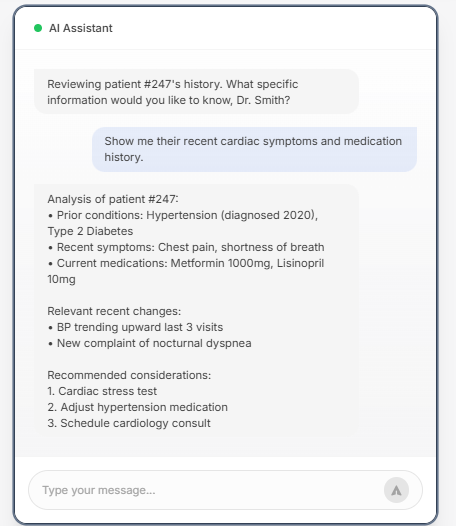
AI Healthcare Chatbots: Why Your Practice Can’t Wait

If you run a clinic or practice, you know how busy things can get. Phone lines stay full, and your team spends a lot of time answering the same questions about appointments, prescriptions, or billing.
AI chatbot healthcare tools are already transforming healthcare and being used by small practices, dental offices, and mental health clinics to help with day-to-day work. They’re easy to set up, work all day and night, and are a way to connect patients to quick support without adding pressure to your staff all while reducing operational costs.
These bots use artificial intelligence to respond in plain language. They can help with appointment booking, answer questions about medical information, and send personalized reminders.
In this article, we'll explain how AI healthcare chatbots work, where they help most, and how your team can use them to reduce the administrative burden and streamline patient communication and interactions.
How AI Medical Health Chatbots Technology Fits Into Patient Care#
You don’t need to replace your front desk team or your nurses. But you probably wish they had more time to focus on real care instead of answering the same questions all day.
AI chatbot healthcare services can support your staff by handling small, time-consuming interactions that add up over the day. These tools are built using natural language processing and machine learning to understand how people talk, respond in a natural way, and even learn from each new interaction. Let’s walk through a few key points where these tools can assist your staff and improve patient management experiences.
Before the Visit#
You can use healthcare chatbots to gather patient information ahead of time. Instead of having your front desk call to confirm details or remind someone of what to bring, a chatbot can send a message and ask for updates.
This includes medical history, insurance, or symptoms so your team has more time and helps you prepare better for the visit.
During the Wait#
Waiting can be frustrating, especially if people don’t know what’s going on. With AI chatbots, you can keep patients in the loop.
Whether it's delays, reminders, or forms to fill out, the bot keeps the line of communication open. That improves patient engagement and helps prevent walkouts or no-shows.
Between Visits#
A lot of patient care happens outside your building. Patients forget instructions, lose follow-up notes, or skip medication. An AI chatbot can help bridge that gap.
It sends personalized reminders, shares up-to-date information, and checks in to collect health data like body weight or symptom updates. This is useful in mental health support or primary care, where steady support leads to better health outcomes.
After Hours#
When your office is closed, questions still come in. Patients may forget instructions, have non-urgent health issues, or want to reschedule. A chatbot is available 24/7 to provide clear replies, share forms, or route urgent concerns to a real person if needed. It makes your clinic more responsive and reduces stress for both staff and patients.
Enhanced Efficiency When Things Escalate#
High-quality conversational AI tools know their limits. When a question involves sensitive information or needs a medical opinion, the chatbot flags the conversation and lets your team step in. This balance between automating routine tasks and human intervention gives your patients access to faster service while keeping your care standards high.
Best Use Cases for AI Healthcare Chatbots#
Across the medical industry, healthcare organizations and healthcare providers of all sizes are putting medical chatbots to work in different ways. Here are some of the most valuable and proven use cases you can apply in your own clinic or organization.
Appointment Booking and Confirmations#
confirming and Scheduling appointments takes time. A healthcare chatbot can handle this by letting patients book or confirm their visits through a simple conversation. This helps reduce no-shows and missed messages and keeps your schedule more organized without extra calls from staff.
Medication Management Reminders#
Good patient care includes keeping patients on track with prescriptions. An AI chatbot can send reminders about possible drug interactions, to take medications, request refills, or follow specific instructions from your office. This is useful for long-term treatments plans, chronic disease management, or post-surgery care.
Pre-Visit Data Collection#
Before a visit, patients can share their medical history, current symptoms, and health data through chatbot prompts. This helps you prepare for each appointment and keeps electronic health records accurate while also saving time at check-in.
Mental Health Check-Ins#
AI chatbots act like personal assistants who are checking in with patients dealing with mental health concerns. These chatbots can ask simple questions about their mental well-being, offer guidance, or connect the person with a live professional if needed. For those needing help with stress management, dealing with anxiety, or depression, this ongoing connection and symptom assessment tool can improve health outcomes and keep patients from falling through the cracks.
Post-Visit Follow-Ups#
Once the appointment is over, healthcare chatbots can continue the conversation. They can follow up with the next steps, ask about side effects, or gather basic feedback. It helps maintain care after the visit and allows you to catch problems early.
Billing and Insurance Questions#
Patients often have questions about co-pays, balances, or coverage. An AI chatbot healthcare system can reply with up-to-date information or route them to your billing team when needed. This cuts down on confusion and lets your staff focus on tasks that require human help.
Patient Education#
Sometimes, patients need help understanding what’s next. Chatbots can explain procedures, answer FAQs, and direct people to trusted content. This supports better patient education without taking more time from your team.
What Makes a Great Healthcare Chatbot#
If you're thinking about adding a chatbot to your care setting, the right one will do more than automate messages.

A great healthcare chatbot fits into your current tools, handles critical information safely, and improves patient interactions without making things harder for your staff.
Here’s what to look for when choosing a tool that supports your staff and helps your patients.
Understands How People Actually Speak#
A good chatbot should understand how people talk. This includes incomplete phrases, questions about symptoms, and follow-ups on past care. It must also use AI technology to understand intent, not just match keywords.
That’s where platforms like Denser.ai stand out. They’re built with smart virtual assistants that respond clearly and help guide conversations for better communication and smoother patient interactions.
Fits Into Your Workflow#
You’re already using systems to track patient information, manage schedules, and store medical records. A great healthcare chatbot won’t force you to change those tools. Instead, it should connect with what you're already using.
You don’t need a tool that forces you to rebuild your system. The chatbot should connect with your calendar, forms, and current communication channels like Facebook Messenger or SMS.
Denser.ai makes the setup simple and flexible. You can launch workflows without writing code and assign specific routine tasks to the bot.
Keeps Sensitive Information Private#
You work with safety data, mental health apps, and patient files daily. That means you need a chatbot that respects privacy. It must protect critical information and reduce privacy concerns.
Denser.ai includes controls for what the chatbot can access, how messages are stored, and who sees what. This protects med internet res, notes, and sensitive details without losing speed or service.
Knows When to Hand It Off#
Not every situation should be handled by a bot. A real healthcare chatbot must know when to stop and escalate.
If something feels urgent or if a message involves ethical concerns, the chatbot should flag your team and allow direct contact. It builds trust and helps improve patient outcomes by connecting people with help when they need it most.
Built for Real Use#
Many tools aren’t built for the market segment you’re in. You need a chatbot that works for small practices, growing care teams, and specialists alike. It should assist users with forms, reminders, follow-ups, and FAQs without overwhelming your staff.
Denser.ai is designed to meet those needs. It helps you save time, respond faster, and provide patients with the support they expect.
How Denser.ai Improves Daily Healthcare Tasks#
If you're aiming for more than just basic automation, Denser.ai brings real depth to your care model. It’s designed to help you make better decisions and support your team and your patients.
Supports Medical Professionals With Real Data#
Your decisions depend on what you see in a patient’s file, such as past tests, medication history, symptoms, and more. Denser.ai pulls that together in seconds and uses smart AI algorithms to find connections, highlight gaps, and track progress.
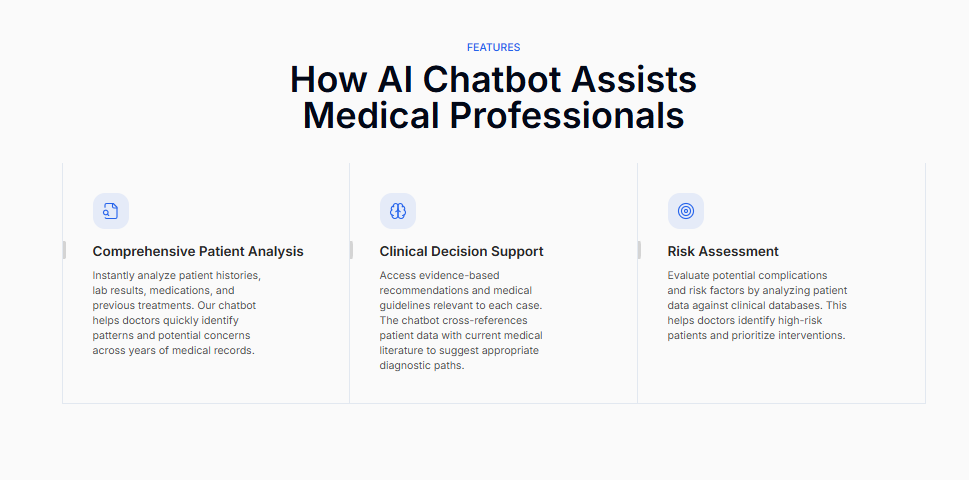
It gives you quick access to medical records, lab results, and prescription history, so you’re not switching between systems or digging through paperwork.
You can also apply exclusion criteria to filter out medical data that are not relevant to a specific case. This keeps your view focused and clean.
The chatbot helps process and uses deep learning to find patterns across history, symptoms, and treatments. It's easier to spot concerns early, support faster reviews, and improve care.
Helps You Make Informed Clinical Calls#
Each case you see is different. With Denser.ai, you can review critical information and match it against medical guidelines or case studies.
The chatbot helps compare patient history with known care paths. It can suggest next steps, flag risks, and offer summaries based on your inputs.
It also helps with risk assessment by flagging potential issues. For example, if a patient is on multiple medications or has recurring symptoms, the bot can suggest follow-up steps or closer monitoring.
Powers Real Healthcare Communication#
Patients expect fast answers. But your staff can't respond to everything instantly.
Denser.ai keeps communication open and handles telehealth services, follow-ups, reminders, and replies through a chat experience that feels natural.
It also helps guide patients with clear answers based on real care details. The more supported patients feel, the more involved they stay.
But it’s not limited to front desk tasks. Denser also supports clinical decision-making, treatment monitoring, and collaborative care by helping you share key insights with other providers.
Designed for Real-World Use#
Most tools force you to change how you work. Denser.ai fits into your existing setup. You can build chatbot flows for specific tasks or use pre-made templates.
This AI chatbot solution also gives you full control over sensitive information. You decide how data is stored, who sees what, and when to escalate to human intervention. You protect health data while still giving your team fast access to the insights they need.
Sign up for a free trial or schedule a demo now!
Misunderstandings About AI Chatbot Healthcare Experiences#
If you're still unsure about using an AI chatbot healthcare tool in your practice, many healthcare professionals feel the same way at first. It's easy to get the wrong idea, but let’s break down a few of the most common ones.
“It’s going to replace my staff.”#
AI chatbots are built to support your team by handling simple tasks like reminders, follow-up messages, or appointment booking.
Your staff still plays a crucial role in care, while the chatbot takes care of the small things in the background. It allows more time for personal care and important conversations.
“My patients won’t trust a bot.”#
It’s true that some patients may prefer a real person at first. But many are already used to chatbot interactions in financial institutions, online shopping, and travel.
In healthcare communication, the key is to use the chatbot where it makes sense, like to remind patients, collect input data, or share up-to-date information. When used right, most patients appreciate the quick, accurate response and easy access.
In fact, a recent national survey showed that nearly 66% of patients are open to using chatbots for common questions or reminders, especially if they can reach a person when needed.
“It’s not safe to share private data with a chatbot.”#
Safety depends on the tool you choose. Generic chat tools aren’t right for the healthcare sector.
However, chatbot platforms built for medical use, like Denser.ai, are designed to protect health data, sensitive information, and medical records. You stay in control of what the chatbot can access, how it stores patient information, and when your team gets involved.
“Only large hospitals can afford this.”#
That might have been true years ago. Tools like Denser.ai are made for teams of all sizes, from private practices to large medical facilities.
You don’t need developers, and you don’t need to change your current system. You can launch a chatbot to help with one task and expand when you're ready.
Can You Trust a Bot With Patient Care?#
You’re responsible for real people with real needs, and trust is the foundation of every decision you make. So, how much of that can you safely hand off to a computer program?
The short answer: You can trust a bot with patient care if it’s doing the right job and built the right way.
It’s About Support, Not Diagnosis#
AI chatbots should never be used to make final medical decisions. However, they are helpful for support tasks that make your team’s day easier and your patients’ experience better.
For example, chatbots can:
- Help patients find the right forms or instructions
- Reply to basic questions about medical services
- Collect details before the visit, like medical history or insurance info
- Share up-to-date information from your care team
- Send personalized reminders about appointments, meds, or follow-ups
This kind of support matters. It fills the space between visits and helps patients stay on track. It also leads to better health outcomes without adding extra work to your staff’s plate.
Built-In Privacy and Limits#
A good tool will never go beyond its limits. Smart systems are trained to know when to pull back and alert your team.
If someone starts asking about symptoms that suggest an emergency, the chatbot should stop and suggest human intervention or a trip to urgent care.
Also, privacy is a major concern, and it should be. You’re working with sensitive information, including health data, medical records, and sometimes even mental health notes.
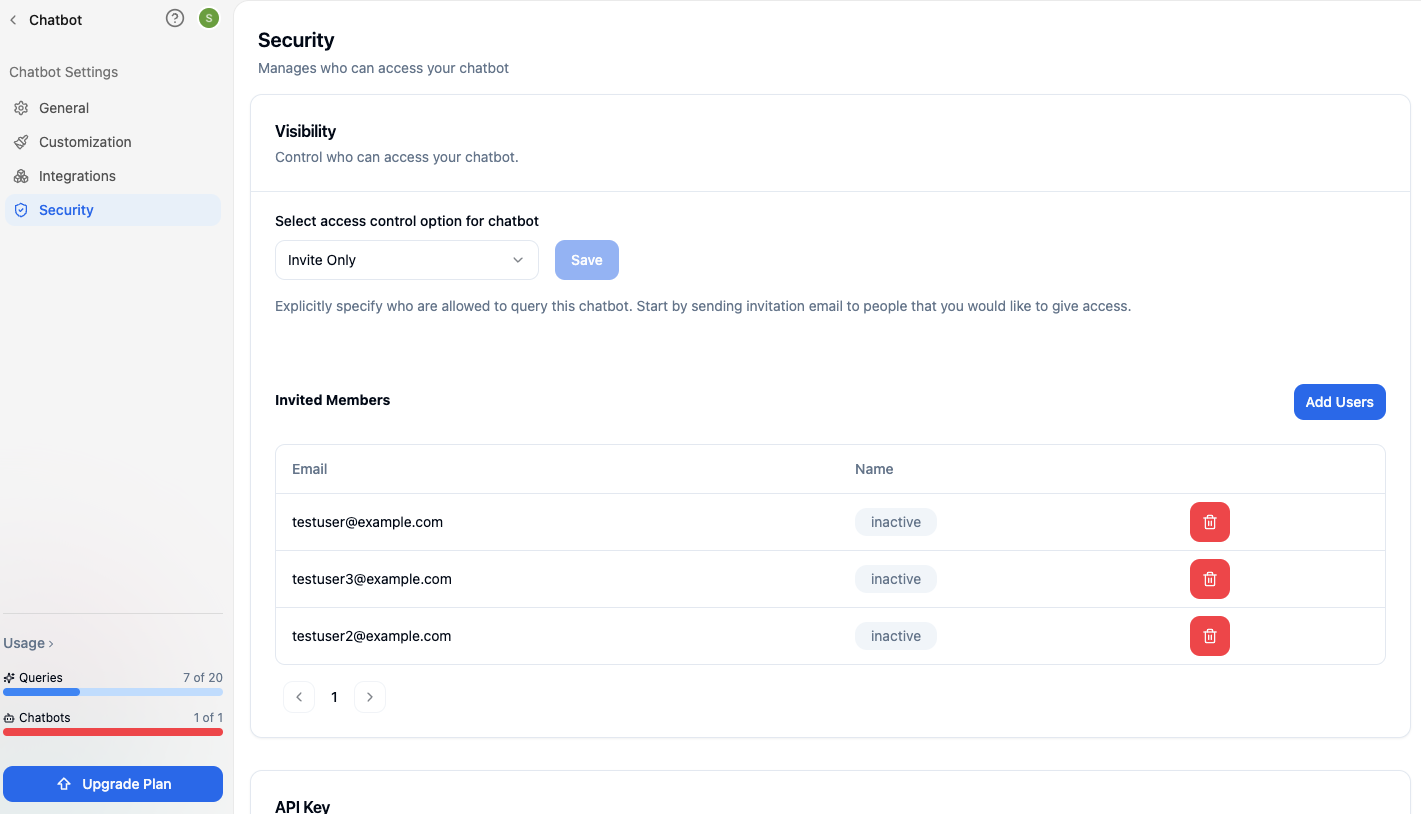
Strong chatbot software follows strict rules around ethical considerations, cultural sensitivity, and data handling. That means only the right people can see or use the data.
What You Can Do to Keep It Safe#
Even with the right tool, it’s still your job to set clear rules. Here are some best practices:
- Decide what the chatbot can and can’t talk about
- Review how it handles and stores medical information
- Train your staff on what to watch for
- Let patients know what the chatbot is for and what it isn’t
This gives patients more control and builds trust over time.
How Secure Are AI Chatbots in the Healthcare industry?#
If you're thinking about using an AI chatbot healthcare solution in your clinic or practice, it's natural to be cautious about privacy and security. You're dealing with sensitive information every day such as messages from patients, intake forms, follow-up updates, and requests that sometimes include symptoms checking or personal concerns. Implementing a chatbot to that process brings numerous benefits, but it also brings responsibility. The tool must protect everything it touches.
From how it collects information to how it shares or stores it, every step should be built with security in mind.
Data Privacy and HIPAA Compliance#
You have to make sure that health data stays where it belongs and is handled properly from start to finish. HIPAA regulatory compliance sets the rules for how you can use tools like chatbots while still protecting your patients.
A chatbot will collect data based on how you set it up. This could include:
- Names and contact details
- Appointment preferences
- Short messages about symptoms
- Feedback from surveys
- Questions about follow-up care
- Relevant responses from telehealth services
Some systems may also collect inputs from forms or symptom checkers, depending on how they’re used. All of this falls under critical information, so it’s important to know what’s being gathered.
With a tool like Denser.ai, you can adjust what the chatbot collects. That gives you control over what’s needed for care and what’s optional.
How It’s Protected#
Once information is collected, it needs to stay protected. You must look for tools that use end-to-end encryption so the data is not readable while it’s being sent or stored.
The platform should also use secure APIs to pass information between systems without exposing it during the process.
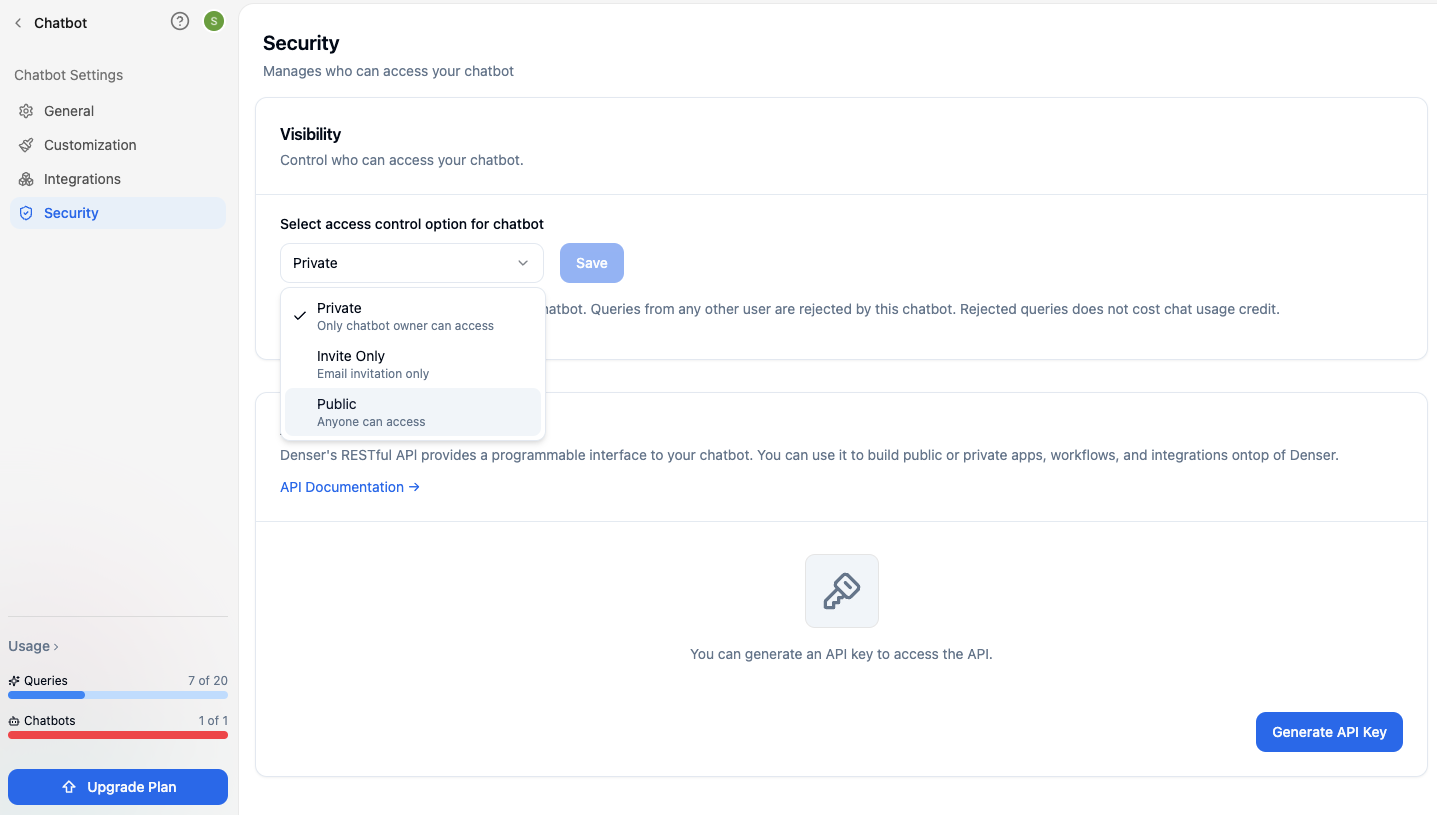
Denser.ai uses both encryption and secure data flow design. It also gives you options for access controls, message limits, and alerts, so you're not just trusting the system; you're managing it actively.
Why HIPAA Compliance Matters#
HIPAA guidelines are in place to protect both you and your patients. They apply to any tool that handles patient interactions, from chat to email to forms. If your chatbot collects, stores, or helps respond to health data, it needs to follow these rules.
Using a chatbot that isn’t HIPAA-compliant increases your risk of data leaks, legal issues, and patient trust concerns.
Denser.ai is designed to meet these standards. It helps you keep privacy concerns low by giving you control over how messages are handled, when they’re escalated to a person, and how long they’re kept in the system.
What to Ask Before You Invest#
Adding an AI chatbot healthcare tool can reduce delays and improve patient engagement. But, like any new tool, it’s worth asking a few key questions before moving forward.
You want something that fits your setup and doesn’t waste time or money. Here’s a list of simple, clear questions to ask yourself and any vendor you’re considering.
What Problem Are You Trying to Solve?#
Start by identifying where your team needs help. Is it an appointment booking? Are follow-ups taking too much time? Do patients have the same questions day after day?
A clear goal helps you pick a tool that meets your real needs, not just one with extra features you won’t use. The right chatbot should help with the tasks that slow your team down while improving patient interactions.
How Will It Help Your Team?#
Talk to your staff. Ask them what repetitive tasks they handle each day. Most likely, they’ll mention things like reminders and missed calls or explain the same things over and over.
These are the tasks AI chatbots are best at. And the more time you save, the more time your team has for real care.
Can the Chatbot Handle User Interactions in a Simple Way?#
You must look for a system that uses natural language understanding. This helps the chatbot reply to questions in a way that feels natural, even when people use different phrases or don’t type full sentences.
How Is Sensitive Information Stored and Protected?#
You need to ask how the tool handles health data, medical information, and other personal details. Look for clear answers about safety, storage, and limits.
The platform should meet basic ethical considerations and be built for the healthcare industry and not just for general business use.
Does It Support Growth?#
You may want to start small, just sending medication reminders, for example. But over time, you might want to add features like pre-visit check-ins or follow-ups for mental health patients. Make sure the tool is flexible enough to grow with your practice.
How to Implement an AI Healthcare Chatbot in Your Clinic#
Whether you run a small office or manage a team, the right setup improves patient interactions and protects health data along the way. Here’s how you can get started:
1. Choose a Chatbot That Fits Healthcare Settings#
Not every chatbot is made for the healthcare industry. You must look for one that’s designed to handle sensitive information, support natural language understanding, and follow HIPAA standards.
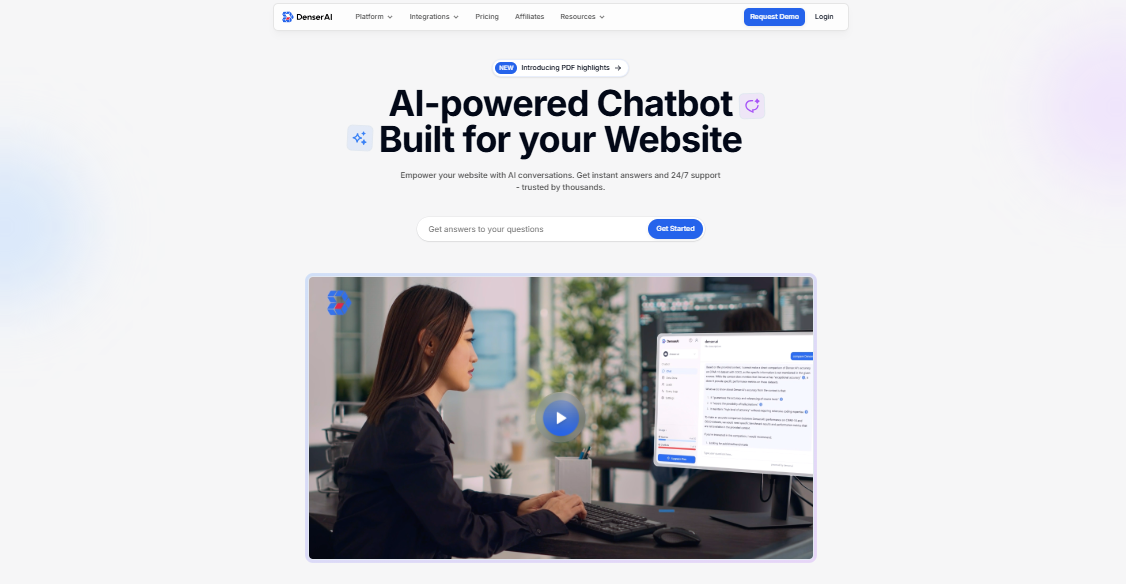
A tool like Denser.ai is built for this. It gives you flexible control and uses smart algorithms to respond clearly and route messages when needed.
Sign up for a free trial or schedule a demo now!
2. Data Integration#
You can start connecting the chatbot to your current systems. Denser.ai allows you to pull in medical data like patient histories, lab results, imaging reports, and clinical notes. This creates a full, organized knowledge base that the chatbot can access.
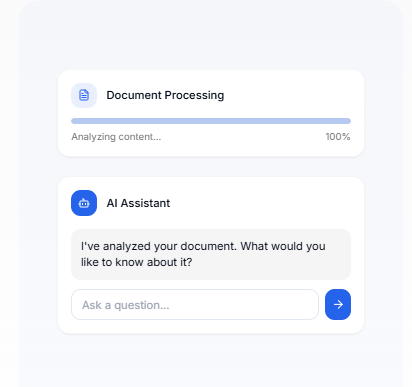
Centralizing this data allows the chatbot to assist your team with tasks like symptom tracking, appointment booking, or preparing for a visit while keeping all critical information in one place.
3. Secure Deployment#
Once data is integrated, the next step is to launch the chatbot within your secured care environment. This protects sensitive information and ensures the chatbot works quickly without compromising privacy.
Whether you run a small clinic or a large group practice, Denser.ai adjusts to your network and follows safety practices that reduce privacy concerns while supporting full performance.
4. Launch and Monitor Patient Feedback#
After the chatbot is active, your team can begin using it to assist with real-time decisions. The chatbot supports clinical decision-making by helping you access and analyze records, spot patterns using smart algorithms, and view evidence-based guidance.
With natural language understanding, the chatbot can respond to patient messages, summarize cases, or help staff navigate complex cases. It leads to improved patient outcomes and stronger support for your care team.
Smarter Patient Care Starts With an AI-Powered Chatbot Solution!#
Ready to simplify your healthcare workflows and improve how you connect with patients?
With AI chatbot healthcare tools like Denser.ai, you can reduce your daily workload and support better decision-making without hiring more staff or changing your system.
From collecting forms to sending follow-ups, Denser helps you manage the details so your team can focus on real care.
Denser.ai is built for healthcare that uses natural language understanding and smart algorithms to handle patient requests and analyze data.
If you need help with appointment handling, symptom tracking, or shared care planning, Denser gives you the tools to do so while protecting patient data and improving customer satisfaction.
You don't have to overhaul your current setup to see results. Start with one workflow and expand as your needs grow.
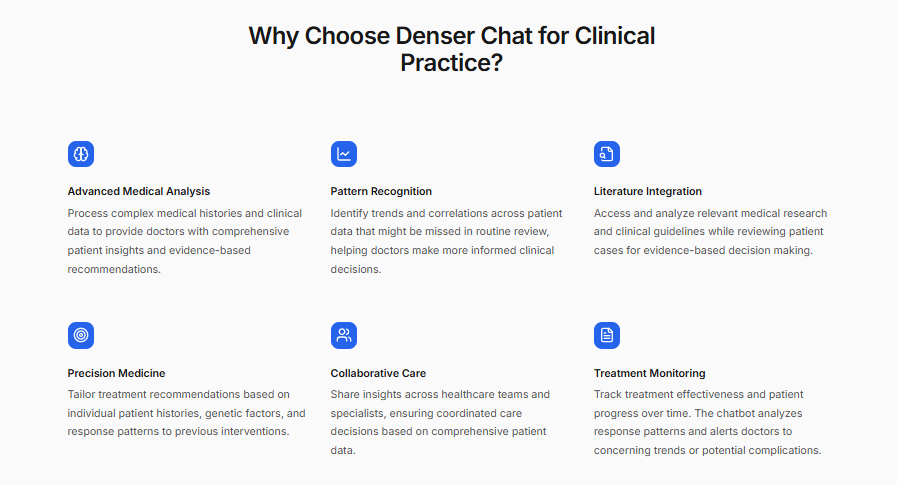
For healthcare providers and medical practices looking for a comprehensive AI chatbot solution, visit our Professional Services Chatbot page to see how healthcare organizations, consulting firms, and professional services use Denser AI to automate client inquiries, capture leads 24/7, and improve patient engagement.
Let Denser.ai help you deliver cleaner records and smoother patient interactions through one flexible, reliable chatbot. Try Denser for free or schedule a product demo today!
FAQs About AI Chatbot Healthcare#
How are AI chatbots used in healthcare?#
AI chatbots help healthcare teams manage routine communication. They assist with appointment reminders, follow-ups, basic instructions, and form collection.
Some platforms use natural language understanding to respond in real time to patient questions. This improves speed, reduces missed tasks, and helps maintain customer satisfaction by giving people clear answers right when they need them.
How is artificial intelligence (AI) being used in healthcare?#
Artificial intelligence (AI) supports patient care by analyzing patterns, predicting risk, and improving workflows. Many tools now use smart algorithms to sort data, flag issues, and help staff review complex information faster.
These systems don’t replace medical judgment, but they support it by making the review process more focused and organized.
Are AI chatbots in healthcare ethical?#
They can be if designed and used correctly. When chatbot healthcare systems are built with respect for privacy and proper oversight, they support ethical use.
Features like natural language understanding help respond accurately, while limits and alerts make sure serious topics are reviewed by staff. The goal is to help the patient stay protected and informed.
What is the best HIPAA-compliant chatbot?#
One strong option is Denser.ai. It uses advanced algorithms and secure design that gives you control over what the chatbot can access or respond to.
With features like natural language understanding, it replies clearly and supports your patients while maintaining your internal safety rules. The system helps you improve workflow and customer satisfaction without increasing your team’s load.